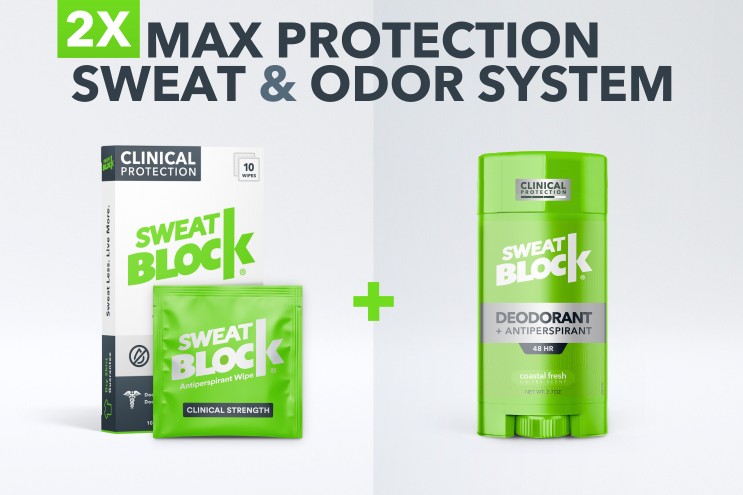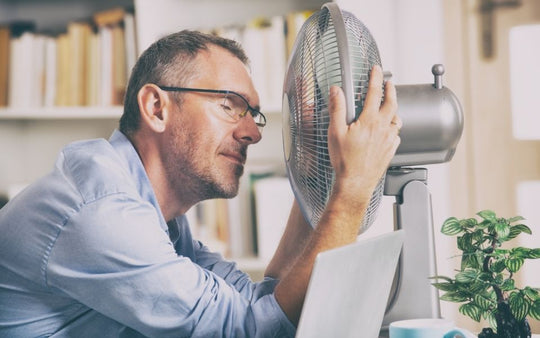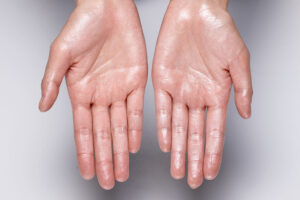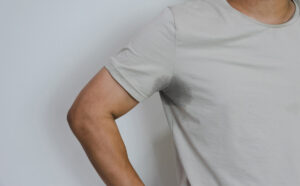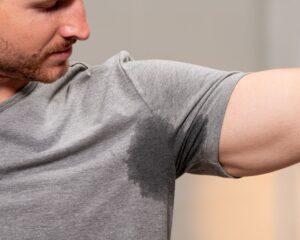Smelly feet can be as embarrassing as public flatulence. Sure, stinky feet may not be as audible. But unlike an untimely “break-of-wind”, that silent –yet deadly– foot odor doesn’t fade.
It’s time to put an end to stinky feet! Here are 12 effective ways to battle foot odor:
12 Tips for Stinky Feet
A Few Smelly Feet Facts
Your feet, especially the soles, are home to the highest concentration of sweat glands anywhere on your body. As many as 250,000 eccrine sweat glands are in each of your feet. The sweat glands in your feet can produce up to a pint of sweat every 24 hours.
Believe it or not, foot sweat is normally odorless. But when it comes in contact with the abundance of hungry bacteria hanging out on your skin, that’s when the trouble begins. The small amount of nutrients contained in foot sweat, along with dead skin cells, provide a feast for skin bacteria and fungi.
The more we sweat, the more there is for bacteria to eat. The more they eat, the more we stink. This break-down of sweat and the rapid growth of bacteria are responsible for the bad foot odor we all dread. If you’re on your feet most of the day, the likelihood of stinky feet is dramatically increased.
We are all subject to sweaty, smelly feet, regardless of the temperature or season of the year. Teenagers and pregnant women are more likely to suffer from stinky feet because of the hormonal changes taking place in their bodies.
Foot odor is normal and doesn’t necessarily mean there’s an underlying health problem–although a health issue is certainly possible. One such serious sweating disorder is called hyperhidrosis. It’s a medical condition that affects about 15 million people in the USA. Those who suffer from hyperhidrosis sweat excessively and for no apparent reason. Excessive foot sweating is known as Plantar hyperhidrosis.
Common fungal infections, like athlete’s foot, produce dry flaky bits of skin that bacteria feed on. The resulting bacteria bloom and grow on your feet, augmenting the smelly feet problem. The “sweat + bacteria = stinky feet problem” is made worse when your feet are hermetically sealed in shoes and socks that prevent any ventilation.
Then, when you finally take off your shoes… well, you know it’s going to be bad news for every nose in the room.
Why Do I Have Stinky Feet?
Before we get to talking about how to get rid of sweaty, stinky feet, let’s look at the common causes.
Shoes Made of Synthetic Materials
If you wear shoes made of plastic, vinyl, or other materials that do not “breathe,” you’re essentially guaranteeing that your feet will stink. These kinds of shoes trap sweat and provide the perfect habitat for growing the pesky bacteria that make your feet smell so bad.
Old Shoes and Shoes Worn Too Long
Remember that old pair of shoes that smells so bad? In time, dead skin and bacteria begin to linger longer in your shoes. Every time you slide your feet in them again, the bacteria begin to party. And, if you wear the same shoes day in and day out, they’re going to quickly become “those smelly shoes.”
Socks: Dirty or Not, Here I Come!
Let’s start with the gross part. Dirty socks are going to be one of the most frequent causes of stinky feet. If you wear a pair of socks for more than one day before washing, the buildup of bacteria is going to be banana-town-crazy.
And, if you wear clean socks that don’t breathe, sweat will be trapped and you’ll end up with stinky socks, shoes, and feet. If the water you wash your socks in is not hot enough, the bacteria will not get killed off and you’ll be starting each new day with a serious foot odor disadvantage. Do your feet smell like what the circus left behind?
Fungal Infections and More
Fungus that attacks the feet, including athlete’s foot (tinea pedis) and nail fungus, will lead to stinky feet. Itching, cracking, redness, and scaling–especially between the toes–are common symptoms of foot fungus.
Another, more serious infection is trench foot. It’s caused by extended exposure to wet, cold and unsanitary conditions. It got its name from World War I soldiers who spent weeks and months in dirty, wet trenches. The bad foot odor is caused by decay as blood supply to the feet deteriorates and tissue begins to die.
Stress and Anxiety
Stress and anxiety can increase the amount of sweating you experience. And since the highest concentration of sweat glands is on your feet, you know what will happen in stressful situations.
Plantar Hyperhidrosis
Plantar hyperhidrosis is one of the four main types of primary focal hyperhidrosis. If you suffer from plantar hyperhidrosis, even the best foot hygiene won’t be enough to help.
Hormones
If you wonder why your feet smell, hormones may be the answer. There’s nobody that scores quite so high on the stinky feet scale as kids and teenagers. Some pregnant women may come close. The cause? Changing hormones.
12 Tips to Prevent Stinky Feet
Fortunately for all of us, there is a stinky-feet remedy for every circumstance. Here are 12 ways you can get rid of that smelly foot odor:
1. Wash Your Feet Often
Mom told you to wash your feet thoroughly, and she was right. Don’t just casually let the suds from your shower wash over your feet. You’ve got to exercise some tough love on them. Wash your feet with an antibacterial soap that will kill the bacteria.
Use a washcloth or body scrubber to really get at them, and don’t forget to scrub between the toes–bacteria often find refuge there. If you don’t shower every day, make it a habit to wash your feet. Starting with clean feet will delay and minimize the inevitable onset of bacteria and chain reaction with sweaty feet.
2. Exfoliate
Exfoliation is a technique used to remove and get rid of dead skin cells. Remember, a dead skin cell is the breakfast of champions for bacteria. If you don’t remove dead skin cells, they will build up providing an all-you-can-eat buffet for the mean, little critters.
Exfoliation will remove those dead skin cells and reinvigorate your feet. Use a natural bristle brush or loofah to exfoliate twice a week. Here’s something to remember: A fibrous loofah or bristled brush is the perfect hangout for bacteria. Make sure you clean them with antibacterial soap after each use.
3. Keep Your Feet Dry
One of the easiest ways to fix stinky feet is to keep them dry. After showering, bathing, or a soaking your feet, dry off completely with a clean towel. Take a few extra seconds and dry thoroughly between your toes. The drier your feet, the less worry you’ll have about foot odor.
4. Choose Your Socks Wisely
Your choice of socks will go a long way to helping you get rid of smelly feet. Wouldn’t it be great if wearing the right socks was the best remedy for stinky feet? Well, it might just be. Take a look in your sock drawer. Push aside the orphans and mismatches and look at their material.
Cotton socks are popular, but they are NOT a good choice for controlling sweaty and stinky feet. Sweat absorbed by cotton fiber does not evaporate. Sweat, bacteria, and foot odor will lurk in those cotton socks until they’re washed again.
The best socks for stinky feet include:
Merino Wool: Merino wool is able to absorb up to 30% of its weight in moisture without feeling damp. It’s light, soft, will help reduce foot odor, and won’t trap moisture next to your feet.
Coolmax: Dupont invented Coolmax in the 1980s. It’s a polyester based fiber that wicks away moisture from your skin. It’s often combined with other fabrics.
Olefin: In 1963, Italian scientists won the Nobel Chemistry Prize for Olefin. It’s strong, lightweight, dries quickly. Olefin also resists soil and stains, and wicks away moisture up to 25 times faster than other synthetic materials.
5. Wear the Right Shoes and Rotate Them
Just like choosing the right socks, it’s crucial that you wear the right shoes. If you’re wondering what to do about your smelly feet, avoiding stench-promoting shoes will go a long way. Stay away from shoes made from artificial materials like plastic or vinyl.
Always choose footwear made from leather, canvas, or other natural materials that breathe. If weather permits, consider wearing open-toe sandals. Keep your shoes dry and rotate your footwear every day. Shoes should be allowed to rest for at least 24 hours before wearing them again.
6. Odor-Fighting Insoles
Among the products for curing stinky feet, some of the most popular foot care products are removable insoles that fight foot odor. They work to deodorize your shoes. Most of them are made from activated charcoal. Activated charcoal, unlike the traditional type, expands and forms pockets that absorb sweat moisture and odor. They can absorb foot sweat throughout your day (or night).
The activated charcoal ingredient not only absorbs the odor but also neutralizes it. Activated charcoal insoles must be replaced every 60 days or so as their ability to absorb moisture and odor dissipates over time.
7. Shoe Deodorizer
If you’re still having trouble battling the stinky odor lingering in your footwear, you may want to try deodorizing your shoes. There are several methods that produce good results:
- Wash Them: If the shoes are washable, throw them in the washing machine or wash them by hand. Use a mild detergent. You could also add some white vinegar to kill bacteria.
- Use a Homemade Shoe Powder: You can make your own deodorizing powder with baking soda, cornstarch, and tea tree oil. Combine 3 tablespoons of baking soda, 1 tablespoon of corn starch and 5 drops of tea tree essential oil. Sprinkle the mixture into each shoe and let them stand overnight. Repeat as necessary.
- Stuff Them: Stuff your shoes with newspaper, cedar wood chips or cedar shoe trees. Unwanted moisture will be absorbed, and the cedar will leave your shoes with a pleasant scent.
- Use a Shoe Deodorizing Spray: Another way to get rid of shoe odor is to use a commercial deodorizing spray. They’re widely available and can kill odor-causing bacteria and rid your shoes of disgusting foot odor.
- Freeze Them:Yup, stick those smelly old dogs in the freezer overnight. The freezing temperature can kill odor-causing bacteria. You’ll want to put them in a plastic bag to isolate them from that container of Chunky Monkey ice cream you’ve been thinking about.
8. Soak Your Stinky Feet
Soaking your feet can help cure stinky feet. They may also prove helpful as an effective home remedy for athlete’s foot. There are several different ways to soak your stinky feet. Here are the most popular methods:
- Epsom Salt Foot Soak: Epsom salt draws moisture out of your feet. Less moisture means less bacteria. Dissolve half a cup of Epsom salt in a large bowl or tub of warm water and soak for 10 to 20 minutes.
- Vinegar Foot Soak: Vinegar also makes your feet uninviting for bacteria. Mix 2 parts warm water with 1 part vinegar. Soak your feet for 15 to 20 minutes. Caution: If you have scratches or open sores, don’t use this soak.
- Essential Oil Foot Soak: Some essential oils have antifungal and antibacterial properties. Fill a large bowl or small tub with hot water (not scalding hot). Combine with a half cup of Epsom salt, 10 drops of tea tree oil and 10 drops of eucalyptus oil. You may also add 1/4 cup of lemon oil or apple cider vinegar. Soak for 15 minutes.
- Mouthwash Foot Soak: Mouthwash products contain active ingredients that can kill fungus. This home remedy treatment is not so much for foot odor itself, but for killing fungus that’s causing the foot odor. Fill a plastic tub with 1 part mouthwash and 2 parts of warm water. You may add some white vinegar too. Soak your feet for 45 to 60 minutes. It’s recommended that this soak is repeated every day until the fungal infection disappears.
9. Foot Sprays and Powders
Another way of going after stinky shoes and feet is with a foot deodorant spray or powder. There are foot sprays for shoes that kill bacteria and deodorize. You can also spray rubbing alcohol inside your shoes. Some sprays are designed to be applied directly on the feet. The highest reviewed are made of 100% natural ingredients including lavender, chamomile, ginger, cocoa, and rooibos tea.
They kill bacteria and also soothe the skin. Also, you can try a foot powder made from corn starch, baby powder, or baking soda. These household powders absorb moisture and can help keep feet dry. Some will even make your feet smell good.
10. Is It Something You Ate?
Many types of food can help or hinder your efforts to get rid of stinky feet.
Here’s some foods you should avoid…
- Caffeinated drinks and hot peppers: These are known to increase body temperature and encourage more sweating.
- Processed and refined carbohydrates: Sadly, pasta, bread, baked goods, and white rice can promote stinky feet.
- Foods that contain lots of sulfur: Onions, broccoli, cabbage, garlic, and onions can cause stinky foot odor as they’re broken down by your digestive system.
- High protein foods: Eggs, red meat, and fish are foods high in choline and carnitine. When these compounds are digested, they can cause foul-smelling fish-like odors.
and here’s some foods you should get more of…
- Foods rich in chlorophyll: Leafy greens and sea vegetation (kelp and seaweed) can help rid the body of stinky-feet compounds.
- Herbs can serve as a cleansing agent.
- Foods with lots of zinc can help reduce body odors, including foot odor. Among the foods high in zinc are peanuts, pumpkin seeds, and–yes, it’s true–dark chocolate (ideally no more than 1 ounce per day).
11. Treat Athlete’s Foot or Foot Fungus
Chances are you’ve had athlete’s foot. It’s that itchy, burning, painful condition caused by a fungus that loves warm, moist feet. Rash, scaly, and cracked skin are the tell-tale symptoms. Adding insult to injury, athlete’s foot also causes your feet to stink.
Fortunately, athlete’s foot will clear within one to two weeks with proper treatment.
Here are a few ways to treat and prevent athlete’s foot:
- 1. Keep your feet clean and dry. Go barefoot when you can. Change socks a couple of times a day, and wear shoes and socks that breathe.
- 2. Use an antifungal cream, spray or powder. Well-known brands include Lotrimin, Tinactin, and Micatin. All are widely available and don’t require a prescription.
- 3. Avoid going barefoot in public places like swimming pools, locker rooms, showers, etc. Wear sandals or flip-flops to prevent infection.
12. Try Antiperspirant
An antiperspirant for feet? Yes. While we think of antiperspirants to control underarm sweat and body odor, they’re not just for your underarms. According to the International Hyperhidrosis Society, “Antiperspirants are considered the first line of treatment for excessive sweating and can be used nearly anywhere on the body where sweating is a problem.”
If you experience excessive sweating on your feet and the smelly feet problem that comes along for the ride, a prescription strength antiperspirant may be exactly what you need. If you’ve been diagnosed with plantar hyperhidrosis, you definitely want to try one. Antiperspirant products for controlling excessive foot sweat contain the same active ingredient, aluminum chloride, found in other antiperspirants.
One application of a prescription strength antiperspirant on your sweaty feet can last for several days. Foot antiperspirants are available as a spray, towelettes or a cream. Once the foot sweating is controlled with a good foot antiperspirant, the stinky feet problem will be significantly reduced.
How Do I Prevent Foot Odor?
“An ounce of prevention is worth a pound of cure,” as the old saying goes. It’s particularly true when it comes to preventing stinky feet. Preventing foot odor before it happens is the best way to treat smelly feet.
Remember to follow these tips to keep your feet smelling nice and clean:
- Wash your feet often. Good personal hygiene is always a great idea.
- Scrub your feet. Exfoliation will remove dead skin and bacteria.
- Keep your feet dry. Dry thoroughly after bathing or showering and, if possible, air your feet out throughout the day. Dryness kills sweaty, stinky feet.
- Wear socks that breathe. Consider specialty sports socks which can wick away moisture. Stay away from heavy socks and even cotton socks if foot perspiration is a problem.
- Wear the right shoes. Always choose shoes that are made of natural materials that breathe. Rotate your shoes. If possible, don’t wear the same pair on consecutive days.
- Use odor-fighting insoles infused with active charcoal. They’ll absorb moisture and neutralize stinky shoe odor.
- Deodorize your shoes often. Wash them if they’re washable. Use a powder or spray deodorizer to sanitize and kill smelly feet odor.
- Soaking your feet with Epsom salt, essential oils, antibacterial mouthwash or vinegar can kill odor-causing bacteria.
- Stay away from caffeinated beverages and spicy foods. Eat foods with chlorophyll, herbs, and zinc.
- Promptly treat athlete’s foot or other infections. They all cause your feet to smell bad.
- If you have plantar hyperhidrosis (or your feet just sweat a lot), use a prescription strength antiperspirant wipe or cream.
We are all vulnerable to stinky feet. It’s a universal problem. Understanding the causes of foot odor and knowing how to get rid of smelly feet can greatly improve your quality of life. Your social interactions will become much more pleasant, and your confidence and self-esteem will skyrocket. The next time you need to remove your shoes, you’ll be able to smile without worrying about stinky feet.
You might also like...
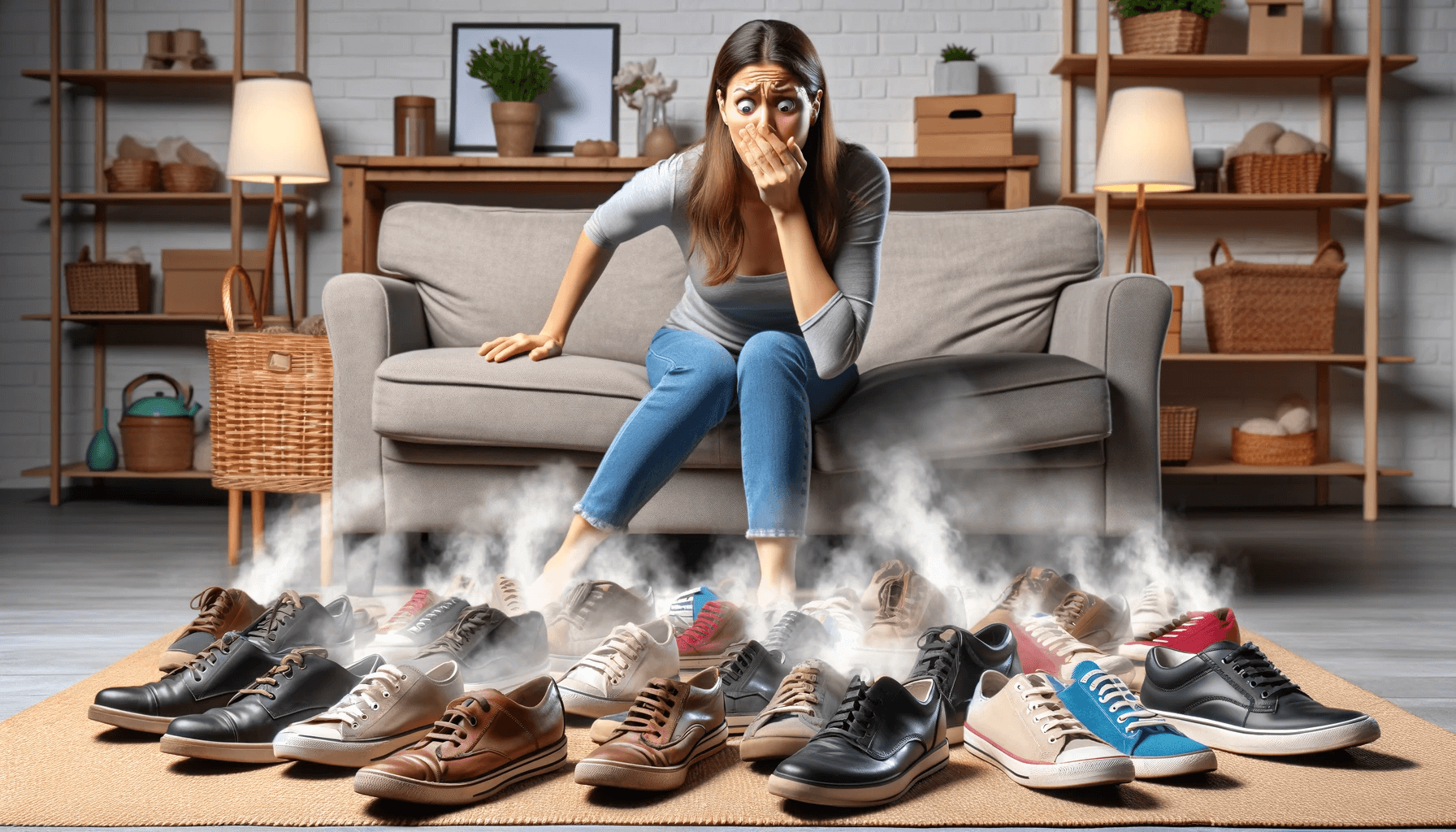
16 Home Remedies for Stinky, Smelly Shoes
Table of Contents So, your favorite shoes stink. You don’t dare take them off even though your feet are screaming
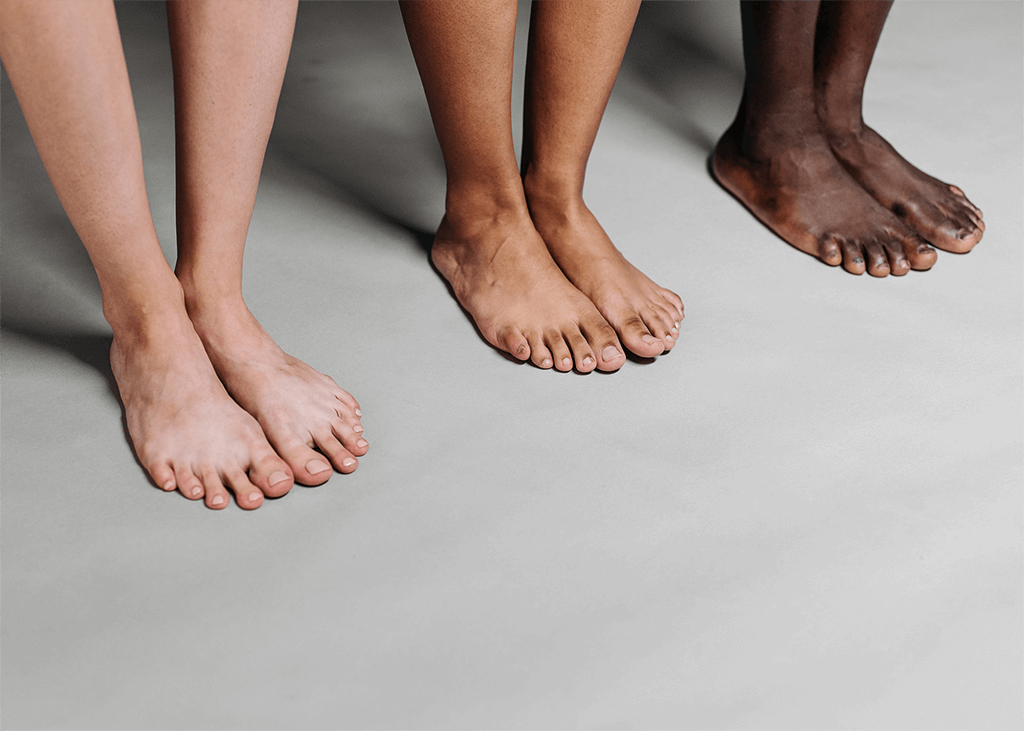
How to Stop Sweaty Feet: Tips, Tricks, and Remedies
There are 4-5 million sweat glands on the human body. Over 250,000 of those sweat glands reside on your feet.

8 Ways to Get Rid of Foul Body Odor
Table of Contents Have you ever wondered who’s rocking the eye-watering body odor – only to figure out it’s you?

